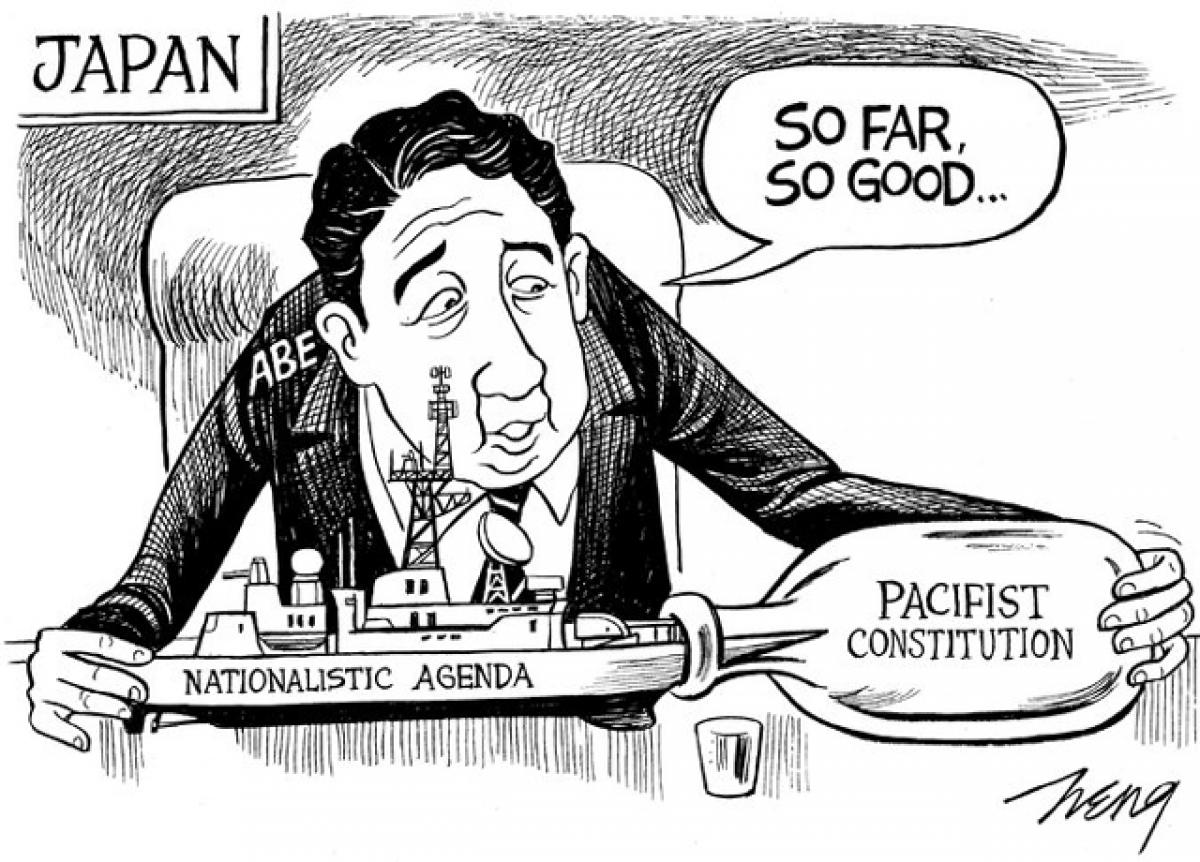Live
- All you need to know about PAN 2.0
- Akasa Air redefines travel experience with industry-first offerings
- MP: Residents stage protests against liquor shop in Indore
- Telugu Actor Shri Tej Booked for Alleged Cheating and False Promise of Marriage in Live-in Relationship
- Toyota Kirloskar Motor Celebrates 1 Lakh Urban Cruiser Hyryder on Indian Road
- MLS: New York City FC part ways with head coach Nick Cushing
- Delhi CM says Centre cutting AAP voters’ names from rolls, BJP hits back
- Hyderabad Metro Rail Phase-II Works to Begin in Old City in January 2025
- Odisha: 668 persons killed in human-elephant conflicts in last three years
- DEFENDER JOURNEYS: TO EMBARK ON ITS THIRD EDITION FROM NOVEMBER 2024
Just In

Japan’s pacifism fades. Nearly to the day of the first successful test of a nuclear bomb in 1945, and just a few weeks from the 70th anniversary of the end of World War Two, Japanese Prime Minister Shinzo Abe pushed through legislation to give his country’s military the power to strike offensively for the first time since the war. It is hard to understate the potential impact of this development.
Nearly to the day of the first successful test of a nuclear bomb in 1945, and just a few weeks from the 70th anniversary of the end of World War Two, Japanese Prime Minister Shinzo Abe pushed through legislation to give his country’s military the power to strike offensively for the first time since the war. It is hard to understate the potential impact of this development.

Domestically, Abe is putting his own job on the line. Voters oppose the new legislation roughly two to one, opposition parties walked out of the vote in protest and the government’s support ratings fell to around 40 per cent. The lower house of parliament’s decision to approve the legislation set off the largest demonstrations in Japan since the Fukushima nuclear accident; a crowd of 100,000 people gathered with signs reading “Abe, Quit.”
Abe took this action knowing that 55 years ago similar protests forced his grandfather, Nobusuke Kishi, out of the prime minister’s job after he rammed a revised US-Japan security pact, seen as too militaristic, through parliament. Abe’s move is also darkly symbolic both in and outside Japan. Most Japanese remain proud of Article 9 in their postwar constitution, through which they became the only nation in modern times to renounce the use of offensive force.
Abe’s walking his country away from this achievement represents the end of the last great ideal to emerge from World War Two, and an almost contemptuous disregard for his citizens’ view of themselves. In addition, as China contests islands in the seas south of Japan, North Korea rattles its nuclear saber and Japan’s Southeast Asian neighbors remember their own World War Two experiences, the new legislation throws additional fuel onto the coals of East Asian tensions.
China’s foreign ministry said the move called into question Japan’s postwar commitment to “the path of peaceful development” and urged Abe to learn the lessons of history… The new legislation does not immediately become law. The measure moves to the upper house, where no vote is expected to be taken. After 60 days, the measure will automatically return to the lower chamber, where Abe’s coalition holds a comfortable majority.
In theory, the decision could then be challenged in the supreme court as being in violation of Article 9, though the court historically rules in favor of the government. That addresses the “what.” The “why” remains much harder to discern. Abe says the legislation is in response to threats facing Japan, including from China. He also cites the murder of two Japanese hostages by Islamic State, suggesting his military could have rescued them.
While these views play well to the ultranationalists who help fund the prime minister’s party, Abe’s critics see them as blather; American security guarantees protect Japan without a (Japanese, at least) thumb in the eye of its neighbours. And even if Japan had the special-forces capability to pull off a hostage rescue, such an action seems well within the intent of Article 9.
Abe also says that the new legislation would allow Japan to help defend the United States, something his critics feel could lead to entanglements in U.S. aggression against China, or even in the Middle East. Abe’s own arguments about defending Japan aside, one real factor is the United States pushing the leader into a more aggressive stance under the banner of “collective defense.”
However, the real “why” likely rests deep inside Abe. He has long held a hyper-conservative view of World War Two. He stated, for example, that Japanese leaders charged with war crimes were “not war criminals under the laws of Japan.” American occupiers arrested Abe’s grandfather, Kishi, as a war criminal for his role in the war.
Some say Kishi, who helped raise Abe, pressed into his grandson his own dream of remaking Japan as a military power and throwing off the postwar constitution. Abe is a politician who found himself powerful enough to act on his own ideas, apart from what many feel are his nation’s legitimate security needs. Abe is apparently willing to pick a fight, risk his job and anger his country, all in service to his own ideology.
By Peter Van Buren

© 2024 Hyderabad Media House Limited/The Hans India. All rights reserved. Powered by hocalwire.com







